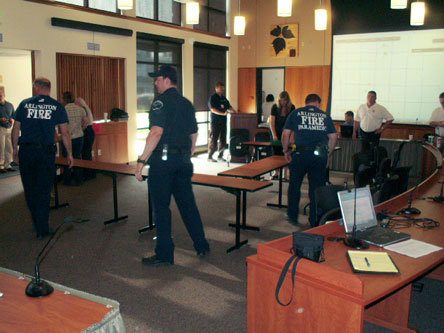ARLINGTON — As health officials nationwide learn more about Swine Flu, Arlington officials continue to coordinate a city-wide response to any threat of a local outbreak.
The three major city organizations — the city of Arlington, the Arlington School District and Cascade Valley Hospital — have been working with Chris Badger, community emergency management coordinator, to establish a jointly operated system to combat an H1N1 virus pandemic or any other emergency within the city.
“Arlington is really working together as a community,” said Badger, who works for the Arlington Fire Department. “It’s the mayor’s directive.”
Badger and other coordinating staff will be hosting an open house on Swine Flu later this month. In addition to the event, the Arlington City Council is slated to proclaim and celebrate the month of September as Disaster Preparedness Month.
All three agencies have had individual emergency preparedness plans in place for years. But Badger’s updated plan, which covers natural and man-made disasters, keeps all three organizations working together to combat large-scale emergencies such as Swine Flu.
The main way to help prepare for such an event is to prevent it from happening in the first place, Badger said.
At the open house, Badger and other staff will have information on hand to help families prepare for any type of Swine Flu emergency.
One document Badger plans to hand out suggests community members have an H1N1 Comfort Kit on hand. The kit should contain Ibuprofen, cough syrup or decongestants, anti-diarrhea or nausea medication, tissues, fluids and crackers.
Alcohol-based hand sanitizer, surface wipes, trash can liners and disinfectant should also be on hand to help prevent the spread of the Swine Flu within the house.
But if such a pandemic does reach Arlington, each agency within the city has a list of planning considerations to combat Swine Flu.
For example, the city of Arlington has a two-page list of items to consider if such a catastrophy hits the area. Points include establishing policies to prevent the spread of the flu and stockpiling critical resources.
“Planning for each (organization) is different, but because of our partnerships, it was easy to come together,” Badger said.
Kathy Boardley, emergency services director for Cascade Valley Hospital, said the hospital has organized an H1N1 task force devoted to tackling the virus should it reach Arlington.
“We’re looking at how we would handle and increase of patients, a lack of supplies and preventing it from spreading within our building,” said Boardley, who is on the 17-member task force. “It really helps us prepare and know our own roles.”
In addition to spreading knowledge into the community, emergency management organizers have been holding training sessions within all the organizations so employees get familiarized with what a city-wide emergency response would be like.
Badger organized a mock disaster in June, during which city and hospital staff responded to a fake earthquake. City officials set up an emergency operations center at City Hall to spearhead the mock disaster.
Badger said she’s been digesting the information she’s learned from the operation, and has been working an improvement plan so that the involved organization can be more efficient in the future should a similar event take place.
“We want to present a unified front to the community,” Badger said. “We’re prepared and we’re asking them to be prepared the same way. That way we keep all three large entities on the same page.”
For more information about the Swine Flu or to learn more about the city’s emergency management plan, visit www.arlingtonwa.gov.







